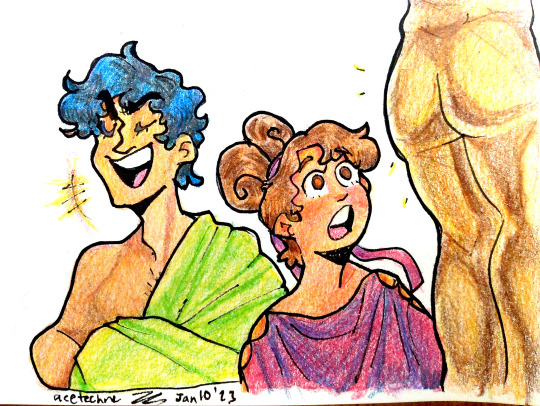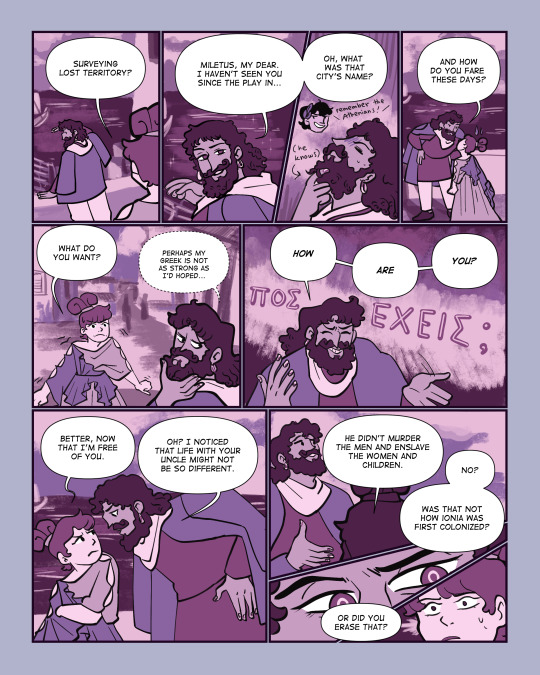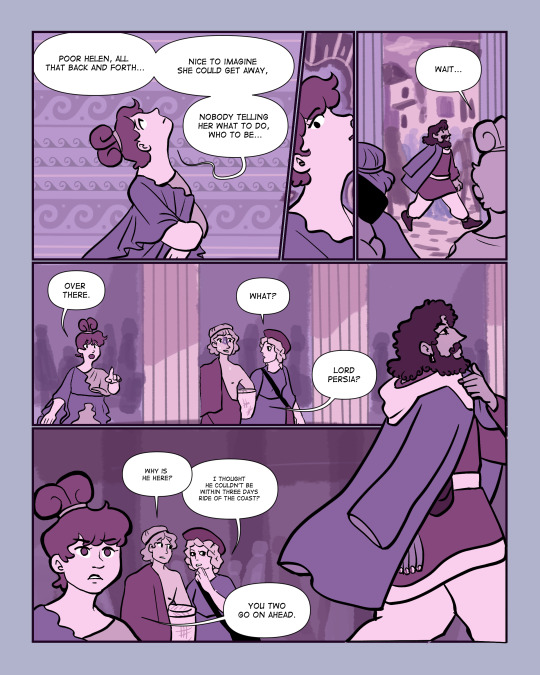#hws ionia
Note
G5 for Athens and G7 for Ionia

she's definitely checking out the lost wax casting techniques that he's describing that's all
#athens and sparta adventures#aph athens#hws athens#aph ionia#hws ionia#aph miletus#hws miletus#aasa athens#aasa ionia#aasa miletus#hapo art#traditional art#mixed media#pencil crayon#ink#art meme#art challenge#expression meme#expression challenge
23 notes
·
View notes
Text
Note: the series was inspired by @athensandspartaadventures by Hapo (@allbeendonebefore ) and has no intention to insult you, rather to entertain you. Without further ado, enjoy!
Big inspiration from @allbeendonebefore. The design for Ionia/Miletus was based from her work.
Ok, let's get down to business 🎶to defeat the Huns.🎶 Two months ago, a greek movie called "Smyrni mou agapimeni" (english translation: "Smyrna, my beloved") circulated in theatres and it had to do with (as you probably have guessed) the great catastrophe of Smyrna back in 1922.
As someone who lives in a town that was founded by immigrants from Asia Minor and since a century has passed from that event, I was intrigued and I immediately started a draft, but due to exams, I didn't finished it until much later.
Inspired by this, I took Hapo's character, Ionia/Miletus and had her star in the poster of the movie. And yes, I know that Ionia is the personification of Miletus, but technically speaking, Miletus is located in Asia Minor, so it makes sense.

We will start first with a historical note to help foreigns understand. I should advise you that I'm no historian, so it's gonna be oversimplified and it would be much more preferable to search the Internet. Here are some links: link 1, link 2. And as always, you can help me add more stuff or correct me for the things I was wrong.
It all started way back in the 19th century, after Greece was freed from the Ottoman Empire. Back then, a plan named "Great Idea" was formed, where we would try to retrieve the terrains that were originally inhabited by Ancient Greeks (namely, South Balkan and Ionia).
This "Great Idea" was finally realised in 1919, with the help of Eleftherios Venizelos and of Entente. At first, the Greek army came victorious and we penetrated even further to the Turkish land.
So, what went wrong? Well, in 1920 Venizelos loses the elections and King Constantine comes to power. This disgruntled many army officers in Asia Minor who were in favour of Venizelos, as well as with the Entente, who never really liked Constantine (since Constantine didn't hide his admiration for Germany's militaristic discipline). All this, combined with the rise of Mustafa Kemal turned the tides in favor of the Turkish army and the Greek army started to back off.
The saddest moment has to be the catastrophe of Smyrna. Smyrna for Greeks was an important city, as the Greek spirit/element was prominent there (more than half of its inhabitants were Greeks). The Smyrnians, as well as other Greeks from Asia Minor, came to mainland Greece as immigrants, desperately looking for a new home and support…
Now, on an critical note: while I don't hate this piece, I don't think that it's one of my best works either. I would prefer a font that it's exactly like the one of the poster, but I couldn't find it on ibis paint. In case you're wondering, this is the poster:

Also, in case you're wondering, NO, we don't want to retrieve Asia Minor anymore. We're passed that.
Next time on the unofficial sequel of AaSA: I finally figured out what to do with Modern Sparta :)
#athens and sparta adventures#athens and thessaloniki adventures#aasa ionia#aasa miletus#aata ionia#aata miletus#aph oc#aph: ionia#aph: miletus#hws ionia#hws miletus#aasa#aata#allbeendonebefore
4 notes
·
View notes
Text

Athens and Sparta Adventures: Chapter 9: Libation Bearers
[previous] [contents] [next]
Updates Saturdays (ideally) :)
It's been a while! Welcome back to the thirty years of peace (continued...)
Comments:
By the time this is posted, I will be out of town on vacation until the end of the month. I decided to risk posting this even though I only have a few pages ready to roll in order to motivate me to finish the chapter, so I hope you enjoy! Let me know what you like and if you have speculations or questions etc etc, I'm always glad to hear from readers to see if I'm hitting the mark (or if you have interpretations that never even occurred to me)
Since I'm out of town, I apologize if I don't edit the "previous" / "next" page links in a timely manner. If I haven't done this by October, definitely bug me about it :)
#aasacomic#aasachp9#hws oc#ancientalia#aph oc#aasa ionia#aasa miletus#aasa megara#hapo art#digital art#clip studio paint#historical hetalia#athens and sparta adventures
29 notes
·
View notes
Text

We are done! Here is the redraw of this art from 2011 (which, of course, has many more characters but I wanted to just focus on the major/recurring characters for this rendition).
It's important to look back and think about my journey this far, I have grown a lot as an artist, a writer, and an academic and it's good to recognize and celebrate :)
Athens and Sparta Adventures will reach its 15th anniversary (scream!!) in September of 2025 when it started as doodles in the margins of my notes in Classics 110 in my first year of university.
#hetalia oc#ancientalia#historical hetalia#aph ancient greece#hws ancient greece#athens and sparta adventures#digital art#clip studio paint#hapo art#aasa illustration#aasa persia#aasa ionia#aasa miletus#aasa athens#aasa sparta#aasa corinth#aasa greece
25 notes
·
View notes
Text

another quick vibe check but this time with colours
the chapter is mostly focused around corinth, but we have equal parts athens and sparta as supporting storylines so I wanted to kind of. shift the colours a little as we move around the ancient world to follow each story. Corinth has the main turquoise/cyan colour, Athens leans towards green, and Sparta leans towards indigo.
#athens and sparta adventures#aasa corinth#aasa megara#aasa athens#aasa ionia#aasa miletus#aasa greece#aasa sparta#aasa persia#aasa lydia#aasa sardis#hapo art#hapo doodles#aasa illustration#aph ancient greece#hws ancient greece
12 notes
·
View notes
Text

[ Chapter 1 ] [ table of contents ] [ recap ] [ Chapter 9 ] [uquiz!]
Welcome to Athens and Sparta Adventures!
Reference map for Chapter 9 of Athens and Sparta Adventures. Characters may be added as they appear or are mentioned in the chapter. Updates on Saturdays, stay tuned!
This chapter has three concurrent storylines: one takes place in Corinth, one in Miletus, and one in Sardis.
New Readers: please note that this comic is not as mobile friendly as some other comics out there. Some directory links such as the table of contents only work on desktop, though mobile users should still be able to navigate using the bolded links above. I started writing this comic back in 2011 and reuploaded it to tumblr around 2018, which is why there’s significant gaps in both my consistency as a creator and in the changes in usability on this hellsite.
See below for brief Character Bios
Characters of Note
MAJOR CHARACTERS
Athens - The arrogant, egotistical and hubristic almost-capital of Greece. Athens’ more legitimate claims to hegemony are primarily his large navy and alliance of islands and city-states throughout the Aegean that purports to defend Greece from future Persian incursions. Although he is entering what we know as the “Golden Age” while the Parthenon and other such major renovations are nearing completion, Athens seems somewhat preoccupied with his vacation in Miletus...
Sparta - Known as Greece’s greatest warrior despite rarely finding reason to leave home on time, Sparta is uneasily resting after emerging somewhat victorious from the First Peloponnesian War. Although accepting a thirty year period of peace with rival Athens, Sparta finds the upstart city-state’s obsession with ‘democracy’ and the growing excuses to coerce new alliances increasingly worrisome. Curiously, he seems to have turned up in Sardis...
Corinth - The rich merchant city-state of Corinth has a vested interest in decreasing Athens’ power. Despite recently recovering her daughter-city of Megara, Corinth still finds others’ loyalties to her being tested. Frustrated by Sparta’s unwillingness to act on her warnings, Corinth suspects that a thirty years peace will do even less to stave off war in Greece. Recently however, she has been receiving disturbing omens...
Megara - Corinth's daughter city, formerly allied with Athens in the previous war to strategically block the path from the Peloponnese. After being herded back in league with the Peloponnesians, Megara is contemplating her divided allegiances and trying to adjust to living with her mother city again. Perhaps she can reach out to someone who might shed some insight on these troubles...
Miletus (Ionia) - Athens’ niece, recently recovered from Persia’s possession after nearly a century after the Peace of Callias. Having spent some time living with her uncle again, Miletus is concerned that Athens’ execution of power are more and more resembling the systems employed by Persia. With her uncle visiting, Miletus looks for distraction in correspondence with an old friend...
Persia - Currently the greatest power in Asia with territory stretching from Egypt to India, Persia has tentatively given up a direct assault on mainland Greece after wasting a lot of time and resources that seems to have accidentally united the disparate city-states against him. Instead, Persia has taken a back seat in his political interference, now preferring words and funds as weapons of choice. The great empire does not make "alliances", but is open and willing to entertain a favourable relationship...
Greece - Known to the others as Hellas, this strange girl shows up to witness foreign invasion and internal strife alike. What has become of her in peacetime?
MINOR CHARACTERS
Argos - An ancient centre of myth and legend, Argos was very quiet throughout the Persian invasions. Argos' sole interest in his current alliance with Athens is a chance to gain vengeance on Sparta for usurping his hegemony of Greece. He's been feeling rather put out by Athens' hasty agreement to peace...
Sardis (Lydia) - A wealthy city-state in Asia Minor, formerly the capital of the kingdom of Lydia which was conquered by Persia’s first king Cyrus over a century prior. Now, Sardis is the administrative centre for that region of the empire and the terminus of the Persian Royal Road from Susa. Despite this, Sardis demonstrates some concern for his rival-turned-friend Miletus in the decade after her exit from the empire.
Corcyra - Another of Corinth's daughter cities. Currently in a dispute with her mother about the upbringing of her own child, Epidamnus.
Syracuse - Another child of Corinth, Syracuse rules over Sicily (and the rest of Magna Graecia) with an ostentatiously decorated fist.
#athens and sparta adventures#ancientalia#hws oc#aph oc#hetalia oc#hws ancient greece#aph ancient greece#aasa athens#aasa sparta#aasa corinth#aasa lydia#aasa sardis#aasa persia#aasa miletus#aasa ionia#aasa megara#aasa argos#aasa greece
11 notes
·
View notes
Photo

Athens and Sparta Adventures: Chapter 8: Book of Ships pg. 6
[previous] [contents] [next]
Quick Ref:
Ionic Greek: The dialect of Ancient Greek spoken in Ionia and also the umbrella under which Homeric Greek falls. Of course, I’ve only studied Attic Greek so that’s what I write all the Greek in :’ ) I’m not sure which dialect(s) Persia would know, but we do know the Persians often made an effort to make their declarations to their subjects in their own languages as well as in Aramaic so he’d have some reason for knowing a little.
Miletus’ Dark Age: During the Dark Age (between the Bronze and Iron age, so named because it is not illuminated for us by much text), Ionia was said to have been colonized by the son of the last king of Athens. Much like the Persians would later, the Athenians killed the men of the city (and then married the women).
Comments:
It’s Persia! He’s back to cause trouble! :)
I had to rewrite this page because it turns out Athens did colonize Ionia much in the same way that Persia did. Or, at least, it’s a long standing literary/historical trope that was used to describe both events. Still, it was so many generations ago and semi-mythical, so it might not be something that often surfaces in Ionia’s memories...? But Persia’s obviously been talking to certain fathers of history or something recently...
#athens and sparta adventures#historical hetalia#hws oc#hetalia oc#ancientalia#aasa miletus#aasa ionia#aasa persia#hapo art#digital art#clip studio paint#aasacomic#aasachp8#i just noticed i drew persia's earrings on this page and Only this page oops
23 notes
·
View notes
Photo

Athens and Sparta Adventures: Chapter 8: Book of Ships pg. 12
[previous] [contents] [next]
Quick Ref:
Agamemnon: The first play of Aeschylus’ Oresteia, referenced in Chapter 7. The titular character only appears for a few lines and is killed shortly after his entrance off screen. His captive Cassandra and wife Clytemnestra are the stars of the piece.
Women in Tragedy: The portrayal of women on the stage in Athens was paradoxical and nuanced, especially since we are given the impression that women were not allowed in the theatre either as spectators or as actresses.
Comments:
I’m sorry guys i think this might be the only time we see Corinth this whole chapter. Keep up your thirst for her though, she has more of a role yet.
COMING UP NEXT, VENGEFUL WOMEN???????
#athens and sparta adventures#aph oc#hws oc#historical hetalia#hetalia oc#aasa persia#aasa ionia#aasa miletus#digital art#clip studio paint#aasacomic#aasachp8
19 notes
·
View notes
Photo

Athens and Sparta Adventures: Chapter 8: Book of Ships pg. 4
[previous] [contents] [next]
Quick Ref:
Helen of Troy: Or perhaps equally appropriately, Helen of Sparta, the most beautiful woman in the world promised by the Greeks to Menelaus of Sparta and also promised by the goddess Aphrodite to Paris, prince of Troy. Helen was not the first woman of legend to be abducted across the Aegean between Greece and Asia, but she is certainly the most famous.
Peace of Callias: The supposed treaty between Athens and Persia, though it is debatable whether it was even real. The terms specified the Persians would have to vacate Ionia within three days ride, but I don’t think Persia particularly cares about treaties with minor backwater city-states even if they are a pain in the neck.
Comments:
I drew Persia in more lightweight Median style clothing today because rather than dressing up for a big theatrical event he’s travelling a little light for some reason. This outfit was probably more appropriate for horseback riding as well.
#athens and sparta adventures#ancientalia#aph oc#hws oc#aasa persia#aasa ionia#aasa miletus#aasa lydia#aasa sardis#aasa halicarnassus#clip studio paint#hapo art#digital art#aasachp8
18 notes
·
View notes